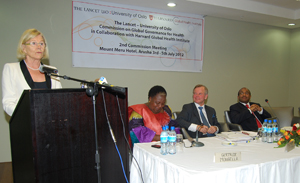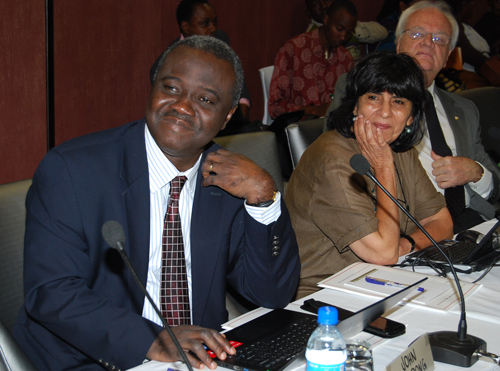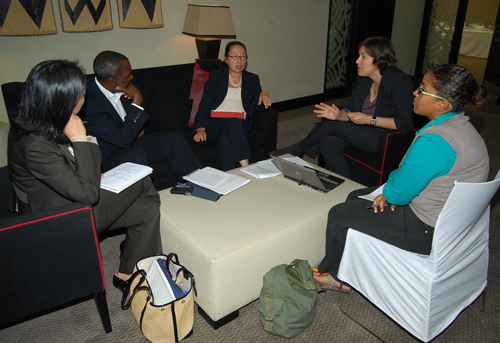The meeting was opened by the Chair Ole Petter Ottersen and the host and Commissioner, Honorary Ambassador Getrude I. Mongella of Tanzania.
In order to let the Commissioners get an insight to the local health challenges in Tanzania and increase awareness about the Commission in the region, “Mama Mongella” had invited the Tanzanian Minister of Health and Social Affairs Dr. Hussein A. Mwinyi and the Norwegian Ambassador in Tanzania, Ingunn Klepsvik to address the Commission. In addition, a range of representatives of local authorities, media and organizations attended the meeting on the first day.
 From the left: Ambassador Ingunn Klepsvik, Hon. Amb. Gertrude Mongella, Commission Chair Ole Petter Ottersen and Minister of Health and Social Affairs in Tanzania Dr. Hussein A. Mwinyi
From the left: Ambassador Ingunn Klepsvik, Hon. Amb. Gertrude Mongella, Commission Chair Ole Petter Ottersen and Minister of Health and Social Affairs in Tanzania Dr. Hussein A. Mwinyi
In the discussions that lasted for three full days, a recurring concern was inequity in terms of power, resources and money, and how this imbalance translates into daily living conditions that negatively affect human lives and health. Other frequently discussed issues with important impacts on health were violent conflict, food security, international migration, social protection, and youth unemployment.
While representing a range of disciplines, experiences and perspectives, the Commission members reached convergence around a number of issues, and together set the agenda for the research to be undertaken before the 3rd meeting in November 2012.
Some of the aims the Commission agreed on were:
- The Commission should provide bold and edgy recommendations on ways to combat the greatest affronts to health, not sidestepping the big, difficult issues that can be linked to lack of purposeful global governance – the causes of the causes of the causes.
- The focus is on how to improve global governance to reduce adverse health impacts that stem from failure or lack of global governance, whether these governance gaps are there by accident or by design.
- The Commission will concentrate its analysis on the political determinants of health, i.e. the governance gaps, drawing on the evidence provided by the Commission on Social Determinants of Health.
Overall, the meeting in Arusha was conducive to the progress of the Commission which bodes well for the further development of the Commission’s work.
 From the left: Commissioners Dr John Gyapong, Professor Rita Giacaman and Dr Paulo Buss
From the left: Commissioners Dr John Gyapong, Professor Rita Giacaman and Dr Paulo Buss
 Group Discussion with Suerie Moon from the Resource Group, Nkosana Moyo, Sakiko Fukuda-Parr and Chantal Blouin from the Commission and Crystal Simeoni from the Youth Commission
Group Discussion with Suerie Moon from the Resource Group, Nkosana Moyo, Sakiko Fukuda-Parr and Chantal Blouin from the Commission and Crystal Simeoni from the Youth Commission
 Commissioners from the left: Virasakdi Chongsuvivatwong, Gorik Ooms and Sakiko Fukuda-Parr
Commissioners from the left: Virasakdi Chongsuvivatwong, Gorik Ooms and Sakiko Fukuda-Parr
